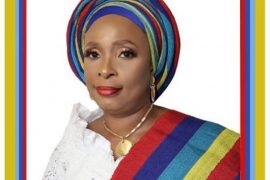Mrs Babalwa Ngonyama, a Chartered Accountant (South Africa), and Chief Executive Officer of Sinayo Securities, a South-African-listed equity sales and trading firm, recently discussed in an interview with Amazons Watch Magazine the rise of women to leadership positions in Africa. The Businesswoman also shared her success story. Except:
Please tell us about yourself- vis-à-vis your experiences growing up as a girl in South Africa and what ignited your interest in entrepreneurship?
I was born in the small town of Cala in the Eastern Cape. I spent the best part of my formative years under the care of my grandmother, while my aunt ran a small farm where I used to sell fruit and vegetables during school holidays. My grandmother was the first person to recognize my entrepreneurial flair and an aptitude for figures. She decided that I should enrol in a commercial school in Mthatha where I also attended University and pursued accounting and business studies until I qualified as a Chartered Accountant (South Africa).
I paid my dues as a young professional working for a number of organizations over the years after attaining my qualification, and have amassed invaluable experience. Since my early childhood years, I have always been clear in my mind that I wanted to be an entrepreneur, I also realized later as I started working that the corporate world would be the best place to prepare for the eventual dream.
My career path has come on the back of persistent hard work, resilience and an ability to overcome challenges. I have always told myself that some days will always be better than others and that I have to bounce back and just keep on working towards achieving my vision.
Your company, Sinayo Securities which is a South-African-listed equity sales and trading firm that provides top quality services to institutional investors in South Africa, over the years prides itself as a black-women owned and managed business. Kindly tell us about your company and the success story behind the black-women-friendly organizational policy.
Sinayo Securities was established in 2015 with a vision to challenge the conventional mindset of investors by providing leading insights on high growth pan-African markets. We also had a key objective of addressing the lack of black women leaders in the financial services sector. We understood that in order to succeed and have a sustainable business, outstanding service, integrity and significant partnerships are critical ingredients.
Part of our success was buttressed by our ability to attract Patrice Motsepe who acquired 49% of the business in late 2016. This deal bolstered our capital base and leveled the playing field by allowing us to competitively pitch for increasingly larger brokerage mandates.
Sinayo has successfully created a graduate programme called Project Funda (meaning “be knowledgeable”). This project fast tracks the development of young graduates through the acquisition of specific technical and on the job skills that accelerate their entry into the brokerage and investment management industries. The majority of our graduates are women.
You are a chartered accountant with a distinguished track record in leadership, sitting on the boards and audit committee of Aspen Limited, a top 20 JSE listed Group Five Limited and Clover Limited, amongst others. You were appointed by the President of South Africa as Deputy Chairperson of Brand South Africa in 2016. As more women continue to break glass ceilings and stereotypes to rise to leadership positions both in business and politics, what is your take on women in leadership in Africa?
There is a saying that no person is an island. The opportunities that I have had throughout my career have been through hard work, determination, and most importantly because of the men and women who believed in me – who gave me opportunities that allowed me to demonstrate my abilities. We are beginning to see more and more women leaders in business and politics on the increase in many of our African countries. I believe that Africa is well poised to take a center stage in changing the global leadership makeup through the inclusion of women in leadership roles in industry and government. I think we should all work together to accelerate the empowerment of women and girls- the rest will play itself out.
It is us as women who must take the primary responsibility for bringing in other women into positions of power and we must do this relentlessly. From the earlier years in my career, I saw a huge gap for women within the accounting industry. I knew that merely observing and complaining was not going to help hence my decision to be the co-founder of the African Women Chartered Accountants which has to date nurtured a number of women and assisted them in fulfilling senior managerial roles.
The reality is that African women have not taken enough seats in leadership positions today and remain under-represented. It is therefore no longer the responsibility of the government alone to address this challenge. Industry and women themselves must come to the party. We must work towards ensuring that women empowerment becomes part of the new way in which Africa does business.
What are some of your experiences as a woman working in male-dominated industries and how do you strive a maintain excellence and achieve success in what you do?
Having grown up surrounded by boys, I knew from a very young age that in order to excel I needed to develop skills to navigate myself around men. The first thing I learnt was that I had to stop comparing myself with them but rather learn from them without changing the person I am and my feminine ways.
According to Catalyst, a global research NPO on women empowerment, male-dominated industries and occupations employ fewer women and are particularly vulnerable to masculine stereotypes that make it even more difficult for women to excel.
Over the years, I have changed and adapted to various work environments to ensure effective management of my career and success. One of the main things I practised was to focus on myself- to build my own self-confidence and to decide for myself what I wanted to pursue and to achieve. What holds women back is not competence, which most women have; but confidence, which is critical to success. Whilst under-qualified and underprepared men leap forward, overqualified and over-prepared women hide in shadows, doubting their abilities, holding themselves to an impossible standard of imperfection.
Focus is what sets you apart and helps you excel in your career, regardless of whether it is in a male-dominated or female-dominated industry. Focusing on things that are within your control, while adapting to those around you, improves the way you function within a business environment, and ultimately enables you to shape your career path.
Throughout my career, I have taken a “learn by example” approach to excelling in the workplace. The men and women I have worked with have had a big influence on that. There are great lessons in particular that I have learned from my male counterparts that have served me well throughout the years to get me where I am today.
You are the founding chairman and currently, a member of the Advisory Board of the African Women Chartered Accountants (AWCA) an organisation focusing on accelerating the development and advancement of women Chartered Accountants. With AWCA and over the course of your professional life, please tell us how you have developed and empowered young women across Africa.
AWCA is a registered section 21 company that was founded in 2002 around the concept of mutual support and personal development. The organisation through a mentorship programme started by the four female directors has successfully made it easier for aspiring young professionals to enter the industry and receive the necessary support in order to assist overcome a number of barriers that might hinder their success. Despite all the successes achieved to date, numerous challenges remain relating to transforming the accounting industry, and AWCA is well-positioned to address both the short and long term challenges.
AWCA has since implemented a three-tier strategy to realise its vision of empowering African Women Chartered Accountants in Southern Africa.
The three-tier strategy includes:
- The identification of young talented girls with the potential to succeed in the accounting profession.
- Nurturing, training and developing aspiring female Chartered Accountants
- Leadership development of both qualified and aspiring Black female Chartered Accountants
AWCA has since developed programmes specifically tailored to meet each tenet of our 3 tier strategy which has been integrated into each of the portfolios. The programmes that fall under each tier speak directly to the goals of the particular tier. The programmes in brief aim to seek out young girls at grass root levels in order to encourage them to consider a career in accounting, nurture and train these girls through mentorship and financial assistance through our bursary programmes and lastly develop leadership amongst them.
Through these focused programmes we strive to embody our motto, “Develop as we lead”.
AWCA is a forum with deep convictions driven by carefully considered values, principles and ethics. With African women making up approximately 3% of the 26000 Chartered Accountants in the country, AWCA has successfully positioned itself to address the gender and continuing disparities that hamper the growth and advancement of African women in this sector, create an awareness of the profession and serve as a support base for aspirant and qualified African women Chartered Accountants.

One of the challenges most women in pursuit of successful career are faced with is that essential and pivotal task of balancing family and professional life. As one of the women who have achieved success in her professional life and has positioned herself as a mentor and role model for young African women, kindly tell us how you balance your family and work life. Has your pursuit of success in your professional life in any way affected your family life?
I believe that most women balance multiple life-roles. We are from an early age taught to be more responsible for various tasks at home compared to our male counterparts. That alone, however, doesn’t fully prepare us to confront the realities of what it takes to pursue a successful career whilst striking a balance in the home front.
My personal take on how to balance one’s life which I always share with other women is the need to put together support structures, simplify your life, and create stability around you. I have made it my business to make my husband play a meaningful role at home by giving him space to do so. As women sometimes we take on every responsibility without bringing others along. We have managed to build a happy family by making each member of the family contribute towards the well being of all of us. We have adopted a “plays your part” rule which works wonders.
The support structure also includes getting a helping hand in the form of a reliable personal assistant in the office, while also investing in a good caretaker who is able can create a warm and safe environment at home. You need to have peace of mind when the meetings run over, knowing that the kids at home are safe. You need to have support structures that allow you to stretch your vision without limitations, and that alone necessitates a supportive environment at home and at work.
Creating good relationships with people in my life is key. The ultimate goal is nurturing your support structures and communicating your vision to everyone around me so that they understand what their role is towards achieving it.
Findings reveal that despite constituting over half of the youth population, young women’s issues are not given the priority they deserve, as they are still under-represented in civic spaces, including in politics, the economy, social affairs, and science and technology. Some of them are derailed from realizing their potential by challenges such as child, early and forced marriages, female genital mutilation, and other harmful practices, as well as limited access to education and to health care. What is your thought on this and how do you think African governments and organizations can address the challenges of young women and provide equal opportunities for both women and men?
The African Population is estimated to be more than a billion people of whom over 60% are young men and women under the age of 35. The majority of African youth continue to face: unemployment, underemployment, lack of skills, relevant education, access to capital, unmet need for health-related information.
Without reinventing the wheel I believe Africa through the Africa Union (AU) African Youth Decade which serves to accelerate Youth Empowerment for Sustainable Development, Corporate Africa and Governments need to foster more integrated partnerships that deliver on the objectives of youth empowerment.
Young African leaders believe that improving access to mentorship and incubators will help them become successful business owners. As a successful entrepreneur and business luminary, what is your take on this and what are some of the essential ways you provide mentorship for the youths of Africa, particularly young African women?
There are no self-made leaders. Every successful leader had someone along with their career that believed in them and opened doors for them. Our young African leaders need mentors throughout the various stages of their development and growth a number of mentors with different skills and backgrounds can fast track the development of a leader. Leadership comes with many challenges, the inspiration, support and encouragement that a mentor can offer during difficult times is priceless.
As the CEO of Sinayo Securities, how would you describe doing business in South Africa and what are some of the investment opportunities in the country?
Doing business in South Africa and on the continent is a double-edged sword it is certainly not an easy place to do business, yet at the same time full of great opportunities. South Africa is a developing country with sophisticated markets, bountiful natural resources and good infrastructure.
Our markets in the continent are buzzing with opportunities and are ready to be exploited. It requires astute business people to navigate the space wisely and take full advantage of opportunities that are available in different sectors. Always take advice, do not make hasty decisions and rush into closing deals. In fact, the guaranteed path to a bad deal is to hurry into what is bound to be a long term relationship.
What is the best way for the readers of Amazons Watch Magazine to connect with you (You can include links to your social networks and websites) Optional?
Please feel free to connect with us via our website: www.Sinayo.co.za



